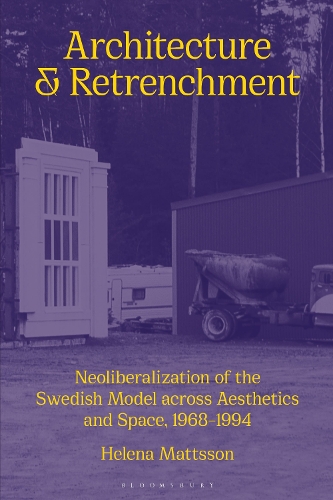
Architecture and Retrenchment: Neoliberalization of the Swedish Model across Aesthetics and Space, 19681994
(Paperback)
Publishing Details
Architecture and Retrenchment: Neoliberalization of the Swedish Model across Aesthetics and Space, 19681994
By (Author) Helena Mattsson
Bloomsbury Publishing PLC
Bloomsbury Visual Arts
25th July 2024
United Kingdom
Classifications
Professional and Scholarly
Non Fiction
790.948509048
Physical Properties
Paperback
272
Width 156mm, Height 232mm, Spine 18mm
620g
Description
Scholars in architectural and urban history have, over the last decade, been trying to come to terms with architectures neoliberal turn and its various impacts - from municipal policy to the artistic imagination. However most scholarship has focussed on generalizations, with very little work to date focussing on specific cases. Architecture and Retrenchment brings one such case to the fore investigating the relation between architecture and the Swedish Model of the welfare state. It tracks the response of architecture to the gradual retrenchment and ultimate dismantling of the Swedish welfare state which was, in its heyday, world-famous for its integration of architecture and the built environment into the welfare system. Ultimately, neoliberal economics prevailed, yet this book reveals how new architectural strategies and techniques were developed in order to protect the agency of architecture in the newly reorganised society of the 1980s and 1990s. Through eight in-depth case-studies, the book situates the often abstract, generalised discourse of neoliberalism and privatisation in specific architectural sites, and provides an original interpretation of how architecture, space, aesthetics, and politics converged at the end of the twentieth century.
Reviews
With consummate authority, Helena Mattsson tracks architectures multifaceted, frequently counterintuitive role in the dismantling of Swedens welfare state. Among so much else, this vivid, theoretically nuanced history of unaccountable power shows how biopolitics stitches architecture and urbanism to political economy, and vice versa. * Reinhold Martin, Professor of Architecture, Columbia University, USA *
With devastating clarity and attention to how buildings and projects emerge, Helena Mattsson demonstrates that architects dont simply provide the image of the neoliberal built environment, they actively develop the concepts, practices and collaborations that bring it about. * Katie Lloyd Thomas, Professor of Theory and History of Architecture, Newcastle University, UK *
Helena Mattsons book adds significantly to the growing literature on the postmodern and neoliberal turn in architecture, by highlighting its complex and place-specific character: its focus on neoliberalisations trajectory in the welfare-state bastion of Sweden provides a welcome corrective to stereotypical Anglosphere narratives. * Miles Glendinning, Professor of Architectural Conservation, University of Edinburgh, UK *
Author Bio
Helena Mattsson is Professor in History and Theory and Head of Department at KTH School of Architecture.
